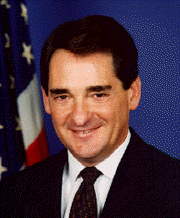
Tauzin (R-LA)
House Subcommittee Holds Hearing on FCC Reform
(October 28, 1999) The House Telecom Subcommittee held a hearing on reform of the Federal Communications Commission on Tuesday, October 26. The FCC Commissioners listened to a wide range of criticism from the subcommittee members.
| Opening Statements |
| Rep. Tom Bliley. Rep. Billy Tauzin. Rep. Chris Cox. |
The House Commerce Committee's Subcommittee on Telecommunications, Trade, and Consumer Protection held a hearing titled "Federal Communications Commission Reform for the New Millennium." Subcommittee Chairman Billy Tauzin (R-LA) presided. All five FCC Commissioners testified and answered questions.
The FCC was criticized for its slow pace of institutional reform, its handling of the e-rate and universal service, its exercise of antitrust merger review authority, its delay in completing antitrust merger reviews, and its imposition of conditions on mergers. On the other hand, several members praised and defended the FCC, particularly with respect to its e-rate program.
 |
|
| Rep. Billy Tauzin (R-LA) |
"When Congress passed the historic and much publicized Telecommunications Act of 1996," Rep. Tauzin stated, "we made fundamental mistake. We failed to reform the outdated structure, and the outdated mission of the FCC when we overhauled the law."
"As a result," Rep. Tauzin continued, "we have, in effect, a horse and buggy agency trying to bridle a supersonic technology, and it simply is not working as well as it could and should."
The FCC has prepared a Draft Strategic Plan for FCC reform which it plans to implement over the next five years. Rep. Tauzin responded that "five years is simply twice as long as we believe is necessary. And this Committee is going to be relentless in seeing that the FCC reforms are completed to a significant degree over the next two and a half years."
Rep. Chris Cox (R-CA), a senior member of the Telecom Subcommittee, stated that the FCC needs to "rethink from the bottom up its entire reason for existence".
Rep. Cox also admonished the FCC to "notice the difference between promoting markets through regulation, and promoting markets. Sometimes we think that by adopting a better, different, or wiser regulation we can get more competition. Whereas, in fact, we simply end up creating another regulation."
However, Rep. Cox devoted most of his comments to the FCC created e-rate program. "We ought to be thinking about ways to shrink regulation, shrink the FCC itself, not create new fiefdoms -- enormous new jurisdictions which are self sustaining with their own non-legislative taxes."
Rep. Tom Bliley (R-VA), the Chairman of the Commerce Committee, criticized the FCC's handling of universal service. "These subsidies are increasingly difficult to justify as we transition to a competitive market," said Rep. Bliley in his opening statement.
"Moreover, consumers should know and understand the extent of subsidies that are embedded in their monthly phone bills," said Rep. Bliley. "And my experience has taught me that politicians and regulators increasingly look to telephone services as a source of tax revenue."
Rep. Bliley is sponsoring HR 3011, the Truth in Telephone Billing Act of 1999, which would require phone companies to inform consumers about each and every telephone tax.
Rep. Ed Markey, who is sponsoring a rebuttal bill, humorously titled the Rest of the Truth in Billing Act, promoted his bill. His bill would also require phone companies to inform consumers about subsidies from which they benefit. Later in the hearing Rep. John Shimkus (R-IL) stated that he found merit is Rep. Markey's approach.
Rep. Ed Markey (D-MA), the ranking minority member of the Subcommittee, also stated that "a radical restructuring would be counter-productive".
 |
|
| Anna Eshoo |
Rep. Anna Eshoo (D-CA) raised several subjects. She commended the FCC for revising its E-911 rules. She stated that she wants to see a paperless FCC. She advocated providing residential customers, especially in apartment building, a choice between carriers. "The FCC should use its authority to offer fair and reasonable resolutions that insures that tenants have access to the local competitors of their choice." Finally, she criticized the FCC for taking to long in its merger reviews.
Several members criticized the FCC regarding its antitrust merger reviews. Some said that the FCC had no antitrust merger review authority. FCC Commissioner Harold Furchtgott-Roth agreed. Rep. Tom Sawyer (D-OH) came to the defense of the Kennard led majority of the FCC.
Other members of the Subcommittee stated that the FCC took too long to complete its merger reviews.
| Prepared Testimony of FCC Commissioners (Links to copies in the House Commerce Committee web site.) |
| William
Kennard. Susan Ness. Harold Furchtgott-Roth. Michael Powell. Gloria Tristani. |
Finally, Rep. Barbara Cubin (R-WY) complained that it was improper for the FCC to use the merger review process to impose or extract conditions from companies. She stated that the FCC was using this process to set policies, and thereby performing a function better left to Congress.
Rep. Eliot Engel (D-NY) discussed minority ownership and content in broadcast media. He commended the performance of the FCC in this area. He also commended Sen. John McCain (R-AZ) for sponsoring legislation in this area.
Telecommunications Counsel, Justin Lilley, sat at the right hand of Chairman Tauzin throughout the hearing.
The members of the Subcommittee who participated in the hearing included Tom Bliley (R-VA), Chris Cox (R-CA), Barbara Cubin (R-WY), John Dingell (D-MI), Eliot Engel (D-NY), Robert Ehrlich (R-MD), Anna Eshoo (D-CA), Vito Fossella (R-NY), Paul Gillmor (R-OH), Gene Green (D-TX), Karen McCarthy (D-MO), William Luther (D-MN), Ed Markey (D-MA), Mike Oxley (R-OH), Chip Pickering (R-MS), Tom Sawyer (R-OH), John Shimkus (R-IL), Cliff Stearns (R-FL), and Billy Tauzin (R-LA).